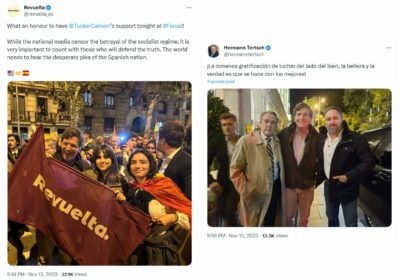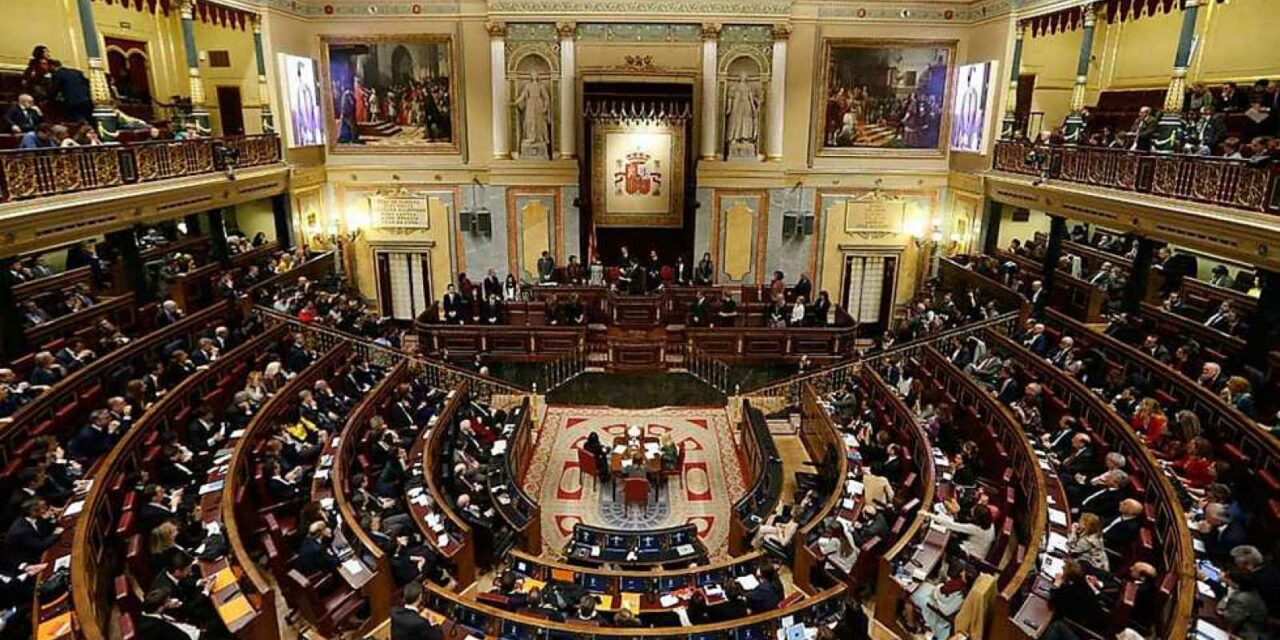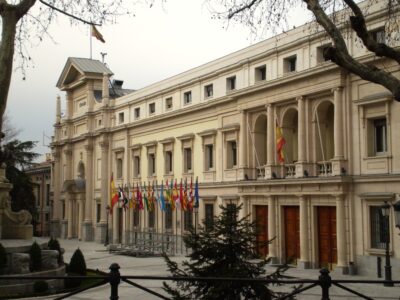There appears to be some vocal division throughout Spain right now, in particular following the July 23 General Election, which left no one party with enough of a majority to form a government without coalition and consensus. The conservative Partido Popular (PP) were invited, as the most voted-for party, to try to form a government but were unable to muster sufficient votes in the Congress of Deputies (Spain’s lower house of representatives), despite backing from the controversial Spanish far-right.
Acting Prime Minister, Pedro Sanchez, from the socialist PSOE, was then invited by King Felipe to see if he could form a government with his coalition partners, and, crucially in order to achieve a majority consensus, he has sought to include the Catalan separatist party Junts many of whom were instrumental in the calling of an independence referendum in October 2017, which led to a deepening divide in Spanish politics. The basis of their agreement was published last week, with promise of a proposed amnesty sparking reactions, sometimes extreme, and some protests.
Spain’s Supreme Court made a statement, seen by many as an unprecedented shot across the bow of any political meddling in the legal process, not only rejecting political oversight of justice, but also emphasising the importance of keeping the pillars of democracy away from the reach of partisan strategies. There are those who imply that the judiciary’s primary function is to apply the law, but it is the legislature (the Cortes Generales) whose job it is to create and amend the law to the political realities. The Supreme Court’s statement is in direct response to the initiative of the Sánchez government, which has sought to reduce “lawfare” or the use of legal processes to delegitimise political opponents, where the law is used as a weapon to pursue political goals. The amnesty, critics say, could be an example of how the law is shaped to serve particular interests, putting the impartiality of justice at risk. Supporters of the amnesty claim that charges against the Catalan separatists have already demonstrated, fruitlessly, the disproportionate reaction by the government of Spain towards their desire for democratic dialogue, resorting to “lawfare” instead of political negotiations.
Democracy and Dialogue over Conflict and Criminalisation
Following the October 1st (2017) referendum attempt and subsequent declaration of independence, the Spanish government of the time (PP), having ignored any requests for dialogue then denied the process any legitimacy, they dissolved the Catalan institutions and pursued criminal charges against many of the elected politicians who had tried to fulfil their mandate for debate and a democratic vote on the subject. The continued criminalisation of public servants, and subsequent arrest or exile of the separatist leadership, led to a long-running judicialisation of what was seen by many to be a constitutional question of democracy. Refusing to even discuss the issue and threatening prosecution has not made the problems go away, in fact for many it has entrenched their views leading to ever-fewer opportunities to discuss how to resolve the issues in the best interests of the people of Spain.
Ever since it has become apparent that Sanchez would need to negotiate with Junts, the far right and the more moderate conservatives of the PP have sought to paint any such negotiation as a bargain with the devil. While the socialist left seek to explain that the criminal and judicial route has not in any way resolved the problem of democratically elected representatives being turned into criminals, even as they try to find solutions on the legitimate concerns of their electorate without conflict or confrontation. What happened in Catalunya should not have happened as it did, and it is the job of our elected representatives to try to resolve the issues, not lock each other up.
Proposed Amnesty Law
Published today a newly proposed law the “Ley de Amnistía Pacto de Investidura” (a basic (machine) translation into English here) attempts to address the complex and long-standing political conflict in Catalonia, focusing on promoting dialogue, reconciliation, and the normalisation of relations between Catalonia and the rest of Spain. The key aspects of the proposals include:
 Promotion of Dialogue: Emphasising the need for political dialogue over judicial measures to resolve the conflict, suggesting that legal actions against political figures may have exacerbated the situation.
Promotion of Dialogue: Emphasising the need for political dialogue over judicial measures to resolve the conflict, suggesting that legal actions against political figures may have exacerbated the situation.
Amnesty as a Tool for Reconciliation: The law proposes amnesty as a means to facilitate the reintegration of political figures into public life, aiming to create a more conducive environment for dialogue and negotiation.
Exclusion of Serious Offences: It explicitly excludes serious human rights violations, like torture or terrorism, from the amnesty, focusing on acts strictly related to the political and social context of the Catalan independence process.
Historical Precedents: The document references historical precedents for amnesty in Spain and other countries, suggesting that it’s a recognised legal tool for resolving political conflicts.
Spain’s mainstream political right have said that this is in some way an attack on the constitution, in their opinion giving law-breakers a “get-out-of-jail-free” card, opening the way for anyone who wants to break up Spain to attempt it with impunity. The more extreme right have gone much further, claiming that this deal attempts to break the constitutional order and is a direct attack on the rule of law and judicial impartiality.
Of course what many of these opposition arguments fail to recognise, in their rush to cry foul, treachery and dictatorship, is that this is just the first draft, a proposal, to be introduced to the Cortes Generales (parliament) for debate. All of the urgency, all of the acrimony and so-far all of the violence has come from supporters of the right, less so from the more centrist conservatives than from the extremes, but none-the-less using language disproportionate to the actual democratic process of creating legislation.
What happens next?
Whether this agreement is a worthwhile endeavour will depend on various factors, not least of all the bills transition through the Spanish Cortes, starting with the congress of deputies whose job it is to decide its effectiveness in resolving conflict; if the law successfully re-establishes dialogue and helps resolve the political conflict, it could be seen as worthwhile. They will debate the measure of public opinion and support for the bill discussing the acceptance, or otherwise, of the law by the public, both in Catalonia and the rest of Spain, which will be crucial for its overall success. They will take into account the legal and ethical considerations; as the law must align with broader legal and ethical standards, both nationally and internationally. Spain’s democratically elected representatives will also weigh up the impact on democratic principles, debating how the law affects basis of this constitutional democracy, including the rule of law and human rights, all key considerations.
Ultimately, the assessment of this law’s worthiness will depend on a multitude of perspectives from legal experts, politicians, the public, and how this all aligns with the democratic principles set out in the Spanish Constitution, and ultimately how far it goes towards the overall goal of resolving the Catalan question.
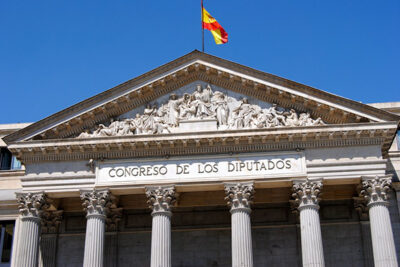 How Laws Are Made in a Democracy
How Laws Are Made in a Democracy
For anyone unfamiliar with how laws are made, or amended, in a democracy, the legislative process in Spain, particularly for a bill like the “Ley de Amnistía Pacto de Investidura” being introduced in the Congress of Deputies, involves several stages:
- Presentation of the Bill: The bill is presented to the Congress of Deputies. In the case of this specific law, it is introduced by the parliamentary groups.
- Admission for Processing: The Board of the Congress of Deputies decides on the admission of the bill for processing. If admitted, the bill is published in the “Boletín Oficial de las Cortes Generales” and sent to the Government for its opinion.
- Government’s Opinion: The Government can provide its opinion on the bill. This opinion is not binding but can influence the debates and proceedings.
- Debate in the Plenary: The bill is debated in a plenary session of the Congress. This is the first reading, where the general principles of the bill are discussed. The deputies can vote to proceed with the bill, amend it, or reject it.
- Committee Stage: If the bill passes the first reading, it is sent to a parliamentary committee relevant to its subject matter. The committee examines the bill in detail, and amendments can be proposed and debated.
- Report by the Committee: The committee prepares a report on the bill, including any amendments. This report is then sent back to the plenary.
- Second Debate in the Plenary: The bill, along with the committee’s report and amendments, is debated in a second plenary session. Each article and amendment is voted on.
Senate Review: If the bill is approved in the Congress of Deputies, it is sent to the Senate. The Senate can veto or propose amendments. A veto can be overridden by an absolute majority of the Congress of Deputies.
- Final Approval: If the Senate amends the bill, it returns to the Congress for a final vote. If there are no amendments or vetoes, or if these are overridden, the bill is considered passed.
- Sanction and Promulgation: The final step is the sanction by the King of Spain and publication in the “Boletín Oficial del Estado.” The law then comes into force on the date specified in the text.
Throughout this process, the bill can be modified, and its progress depends on the political dynamics, debates, and negotiations within the Congress and between the Congress and the Senate.
Conservative and Far Right Protests Against Pedro Sanchez Madrid PSOE Amnesty Policy
The Spain Report - Lawfare, Tucker Carlson & Amnesty Tensions
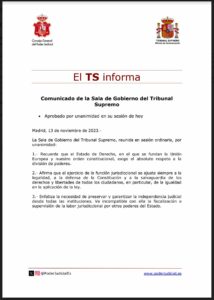 Matthew Bennet’s The Spain Report deals with several reactions of the day, starting with Spain’s Supreme Court having issued an extraordinary statement on the matter, demanding “absolute respect for the separation of powers” in Spain. They have have reminded everyone “that the rule of law, on which the European Union and our constitutional order are founded, requires absolute respect for the division of powers.” They went on to affirm “that the exercise of the jurisdictional function” should be “always in accordance with legality, the defence of the Constitution and the safeguarding of the rights and freedoms of all citizens, in particular, equality in the application of the law.” They emphasised “the need to preserve and guarantee judicial independence from all institutions.” Saying that they see “the oversight or supervision of jurisdictional work by other powers of the State as incompatible with it.”The Spanish Press have been vocal:
Matthew Bennet’s The Spain Report deals with several reactions of the day, starting with Spain’s Supreme Court having issued an extraordinary statement on the matter, demanding “absolute respect for the separation of powers” in Spain. They have have reminded everyone “that the rule of law, on which the European Union and our constitutional order are founded, requires absolute respect for the division of powers.” They went on to affirm “that the exercise of the jurisdictional function” should be “always in accordance with legality, the defence of the Constitution and the safeguarding of the rights and freedoms of all citizens, in particular, equality in the application of the law.” They emphasised “the need to preserve and guarantee judicial independence from all institutions.” Saying that they see “the oversight or supervision of jurisdictional work by other powers of the State as incompatible with it.”The Spanish Press have been vocal: Spanish language daily ABC published a full-page all text editorial message on its front page against the amnesty deal with Puigdemont: “We must not”, reads the headline.
Spanish language daily ABC published a full-page all text editorial message on its front page against the amnesty deal with Puigdemont: “We must not”, reads the headline. El Mundo features the headline “Sánchez wipes the Catalan independence crisis from History so that Puigdemont can come back a free man”.
El Mundo features the headline “Sánchez wipes the Catalan independence crisis from History so that Puigdemont can come back a free man”.- Meanwhile the Guardia Civil is investigating officers belonging to a police association who issued a statement the other day saying they were ready to “spill blood” to defend the Constitution.
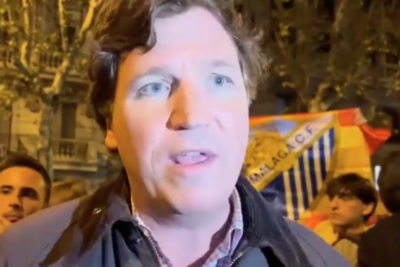 Just to make things interesting, US alt-right talking head Tucker Carlson turned up in Madrid, smiling alongside Vox leader Abascal on the 11th night of protests outside Socialist Party HQ. Carlson said he had travelled to Spain because “the world isn’t seeing it enough and that’s why we wanted to come, because it’s not getting the coverage it deserves […] Anybody who would violate your Constitution, potentially use physical violence, to end democracy, is a tyrant, is a dictator”. He did not make clear who he was referring to as being likely to “potentially use physical violence to end democracy” but the group linked to Vox that has been pushing the protests for the past 10 days, Revuelta, and Vox MEP Tertsch, were overjoyed Tucker was there. There were no arrests or injuries and it was a smaller protest last night.
Just to make things interesting, US alt-right talking head Tucker Carlson turned up in Madrid, smiling alongside Vox leader Abascal on the 11th night of protests outside Socialist Party HQ. Carlson said he had travelled to Spain because “the world isn’t seeing it enough and that’s why we wanted to come, because it’s not getting the coverage it deserves […] Anybody who would violate your Constitution, potentially use physical violence, to end democracy, is a tyrant, is a dictator”. He did not make clear who he was referring to as being likely to “potentially use physical violence to end democracy” but the group linked to Vox that has been pushing the protests for the past 10 days, Revuelta, and Vox MEP Tertsch, were overjoyed Tucker was there. There were no arrests or injuries and it was a smaller protest last night.